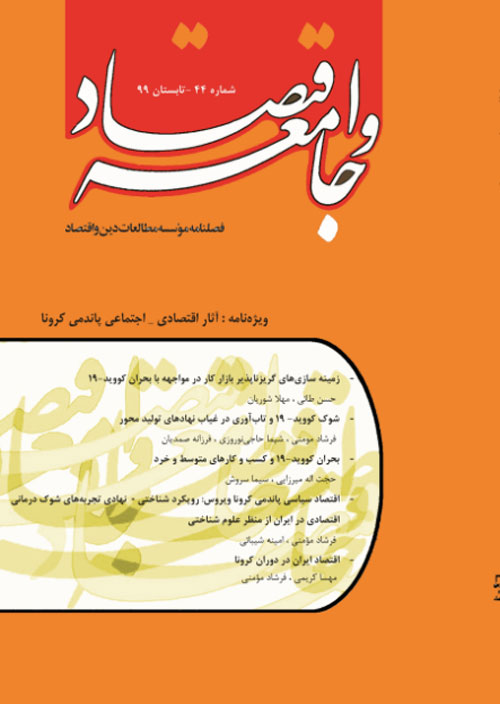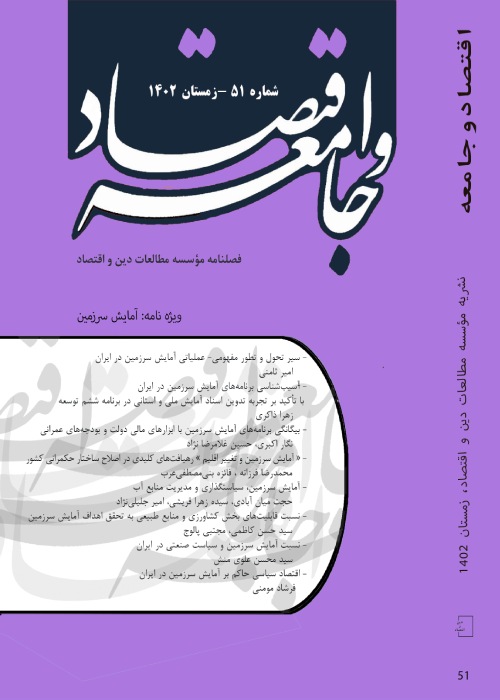فهرست مطالب

نشریه اقتصاد و جامعه
پیاپی 44 (تابستان 1399)
- تاریخ انتشار: 1399/11/02
- تعداد عناوین: 6
-
صفحه 9
-
صفحه 137
ظهور پاندمی کرونا به مثابه یک نیروی محرکه منشا گفتگوها و دستاوردهای اندیش های و سیاستی پرشماری شد هاست که بهر هگیری از آنها م یتواند در خدمت آسی بشناسی عالمانه عملکرد اقتصادی ایران طی سه دهه گذشته و پیدا کردن را ه هایی برای ارتقاء قدرت انعطاف نظام ملی در مواجهه با دیگر شو کهای برون زا نیز قرار گیرد. در پژوهش حاضر با روش تاریخی – تحلیلی و با استفاده از دستاوردهای نظری اقتصاد نهادگرای جدید تلاش شد هاست تا نشان دهد که شرایط اولیه اقتصاد ایران در آستانه ظهور پاندمی حکایت از یک بستر نهادی کژکارکرد و انبوهی از بحرا نهای کوچک و بزرگ دارد و طراحی برنام ه های اصولی برای خروج از آثار و پیامدهای سوء همزمانی سقوط قیمت نفت در بازارهای جهانی، بازگشت تحری مهای ظالمانه و پاندمی کرونا نیازمند توجه به این شرایط اولیه نامساعد و ریش ه ها و منشاهای بنیادی آن م یباشد. یافت ه های این مطالعه نشان م یدهد که در این مسیر بازآرایی ساختار نهادی بر محور افزایش هزینه فرصت مفت خوارگی که ریشه در سیاس تهای پولی، مالی، تجاری و نرخ ارز و صنعتی موجود دارد همراه با طراحی یک برنامه ملی مبارزه با فساد با رویکرد پی شگیرانه و بالاخره طراحی یک نظام حمایت توسع هگراا ز تولید فناورانه در بخ شهای صنعت، کشاورزی و خدمات پشتیبانی کننده از تولید ضرورت و فوریت دارد.
کلیدواژگان: نهادها، عملکرد اقتصادی، پاندمی کرونا، تولید توسعه گرا، فقر و نابرابری، سیاستهای اقتصادی- اجتماعی تولید محور
-
Page 11
The COVID-19 caused a global health crisis that has never been seen before in our biological sphere. From an economic perspective, it’s most important consequence was a change in the business ecosystem; that is, it transformed all elements and systems which affect their life and balance, in different layers. According to estimates of ILO, by the end of the second quarter of 2020, the working life of 14 percent of employees affected by the crisis; we have lost about 400 million jobs, and the global economy has witnessed the loss of incomes about 8 trillion dollars. For tackling the impacts of the COVID-19 crisis, the ILO has structured, based on the organization's standards, its key policy messages around four pillars: stimulating the economy and employment; supporting enterprises, jobs and incomes; protecting workers in the workplace; and relying on social dialogue for solutions. The COVID-19 crisis cast light once again on the issues such as women, migrant workers, violence, and harassment in the world of work. The world after coronavirus requires a profound transformation in the lifestyle of all human beings, and most of all, it affects our life and career skills. Essential changes took place in all countries and international environment and it has made it inevitable to reconsider the policy coherence that countries had achieved before the crisis in each level.
Keywords: COVID-19, labor market, migrant workers, Women, the world after the Coronavirus -
Page 55
The present article, with a descriptive-analytical approach and within the framework of the new school of institutionalism, focuses on the importance and role of production in creating resilience and shows how the neglect of production can make countries vulnerable to exogenous shocks such as Covid-19 disease. Global experience shows that countries with export-oriented manufacturing sectors and their institutions that encourage production, especially in the industrial sector, are more responsive to external shocks, including coronaviruses, and conversely, in countries with poor production capacity, dependent on oil exports due to institutional inefficiency, the informal sector is wider in their economies, and are among the poorer and developing countries, the damage from the outbreak to their country is widespread and it will be more lasting. An overview of the state of the country's economy over the past decade and how to deal with external shocks, including the shock of the Coronavirus, shows that the country has a long way to go to achieve a resilient economy. The dominant institutional framework in the country, especially in recent years, which has been very beneficial to the unproductive and rent-seeking sectors and has severely weakened the productive strength of the country. An examination of the most important protection measures that the policymaker has implemented since the outbreak of this disease shows that manufacturing businesses and production support services, in order to enjoy the support, have been largely neglected by the policymaker. Also, given the continuing outbreak of coronavirus and uncertainty about future vaccine availability, there is a need for macro-policy and long-term planning to support manufacturing firms and businesses in order to prosper the economy and maintain the resilience of the economy is felt more than ever.
Keywords: Covid 19, Macroeconomics, Small, Medium Businesses, Government Support, Digitization -
Page 87
In early 2020, the world was faced with a phenomenon that perhaps few people thought that affect these dimensions. The outbreak of the corona virus has affected the world economy, especially small and medium-sized businesses. So, this article examines the effects of the corona virus outbreak on medium and small businesses in the world and some selected countries. Impact of Corona virus outbreak on macroeconomics (GDP, unemployment, etc.), level of human development, medium and small businesses and the impact of the Corona crisis on them, reactive approaches of medium and small businesses to the corona crisis and Government support for small and medium-sized businesses in the Corona crisis and, finally, a brief overview of selected small and medium-sized businesses in the country's digital economy are some of the areas covered in this report.
Keywords: Covid 19, Macroeconomics, Small, Medium Businesses, Government Support, Digitization -
Page 113
Pandemic diseases have been known in the world for thousands of years, and from the earliest years of social life, humans have been involved and led to fundamental changes in countries, the most recent of which is the spread of coronavirus in December 2019. Which poses a serious threat to the world, with UNDP reporting that it is the biggest challenge facing the world since World War II. The pandemic, like a wave, travels across countries and has the potential to create devastating social, economic, political and even military crises, leaving deep scars. The spread of the disease has created an atmosphere of insecurity in the world and has made people's lives very worrying. The persistence of insecurity can have irreversible consequences, and it is necessary to reflect on this and find solutions to reduce possible harm. Because among the most important studies on the roots of underdevelopment, there may not have been a single case that did not talk about the determining role of insecurity. According to North, however, the conventional economy does not fundamentally question the structure that human beings impose on themselves in order to regulate the environment and thus reduce uncertainty. Therefore, it is necessary to use more comprehensive insights in order to have a better understanding of the consequences. Given the ranking of macro-level studies relative to micro-level and development-level relative to macro-level, it is necessary to study the various consequences of experiencing the uncertainty conditions of the 2019 Coronavirus pandemic and finding ways to reduce potential harms. . The present study is library in terms of purpose, application and development, and in terms of the type of studies, and explains the situation with a cognitive-institutional approach. The findings suggest that coronavirus pandemic, as an extrinsic shock, affects the brain, heart and the entire human cognitive and vital system, causing severe damage to society and causing many disorders around the world, including social anxiety. This has raised serious concerns for citizens in all countries, even in societies where the corona has not yet spread, and has led to the adoption of unreasonable policies by policymakers in some countries. The reaction of most world leaders to the pandemic of coronavirus has been almost identical. Nearly all world leaders have identified the situation as a war situation and have taken steps to end the war; governments have rapidly changed their role, the health of citizens has become a top priority, and special rules have been set for the new situation. Of course, many developing countries, such as Iran, have not been able to adopt serious and difficult regulations due to the economic problems they face, and have given priority to continuing production and economic survival. Iran's fragile economy, in the shadow of the organized interventions of rentier and unproductive institutions, was in a critical situation even before the pandemic of Coronavirus. Continued doubledigit inflation, along with falling oil prices, continued economic sanctions and disruption of production activities or community service sectors, plunged Iran's rentier economy into a stagflation, leading to a more rapid economic collapse than ever before. River. The findings of this study show the lack of economic, social and sometimes political stability in different societies, each of which, along with the uncertainties caused by the pandemic shock of coronavirus, further increases the cause and increases the feeling of insecurity and uncertainty among the people. . In this way, societies are increasingly exposed to the dangers of anxiety and fear that have been expressed before, leading to more social harm, which indicates the need to adopt stable policies rather than violent and shocking ones. The findings of the present study show that overcoming the country's critical situation requires the creation of a set of institutions that are immediately adaptable to shocks, riots, and pervasive uncertainties that characterize any society over time. The control of violence, the increase in the rule of law and the increase in trust over time, through which the government supports organizations and ensures the implementation of agreements between them, were introduced as three key processes of progress. In other words, strengthening national institutions that promote national production and paying attention to the issue of sequences in policy-making, as fundamental solutions to the problem of current uncertainties and even creating long-term stability in the country, was proposed.
Keywords: Political Economy, Coronavirus Pandemic, Uncertainty, BrainForehead, Social Infection, Production, Sequence -
Page 137
The emergence of the coronavirus pandemic as a driving force has been the source of numerous intellectual and political discussions and achievements which using them can serve the wise pathology of Iran's economic performance over the past three decades and finding ways to enhance the resilience of the national system in the face of other external shocks. In the present study, using the historical-analytical method and using the theoretical achievements of the new institutionalist economy, an attempt has been made to show that the initial conditions of the Iranian economy at the beginning of the coronavirus pandemic indicate a dysfunctional institutional context and a multitude of small and large crises and the design of principled programs to overcome the ill effects and consequences of the simultaneous fall in oil prices in world markets, the return of cruel sanctions and the coronavirus pandemic need to pay attention to these unfavorable initial conditions and their root causes and origins. The findings of this study show that in this direction, the rearrangement of the institutional structure, based on increasing the cost of free eating opportunities rooted in existing monetary, financial, trade and exchange rate and industrial policies, along with designing a national anti-corruption program with a preventive approach and Finally, the design of a development-oriented support system for technological production in the sectors of industry, agriculture and production support services is necessary and urgent.
Keywords: Resilience, Institutional Framework, Production, Shock, RiskManagement


